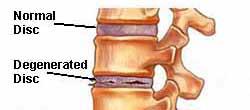We all know that carrying extra pounds carries health risks, but did you know weight gain can directly effect your lower back, even play a role in disc degeneration?
 Past studies of Body Mass Index(BMI) link carrying extra pounds around with low back pain. A new study, links weight gain to lumbar disc degeneration.
Past studies of Body Mass Index(BMI) link carrying extra pounds around with low back pain. A new study, links weight gain to lumbar disc degeneration.
The new study, done in southern China, included more than 1,000 men and nearly 1,600 women aged 21 and older. Overall, 73 percent of the participants had lumbar disc degeneration, but the condition was more common in men than women (76 percent vs. 71 percent) and more prevalent among older people, according to the study in the new issue of the journal Arthritis & Rheumatism.
Seven percent of the study participants were underweight, 48 percent were in the normal weight range, 36 percent were overweight and 9 percent were obese, the investigators noted.
“Research confirms that with elevated Body Mass Index (BMI) there is a significant increase in the extent and global severity of disc degeneration in the back. In fact, end-stage disc degeneration with narrowing of the disc space was more pronounced in obese individuals,” said Dr. Dino Samartzis, of the University of Hong Kong in a journal news release.
Study authors suggest that as people gain weight, disc degeneration may begin to occur due to physical loading on the disc. In addition, fat cells may play a role by causing chronic low-grade inflammation.
“Since overweight and obesity are worldwide concerns whose prevalence continues to rise, our study’s findings have considerable public health implications. If these issues continue to plague society, they can further affect spine health leading to low back pain and its consequences,” Samartzis said.
Back disc degeneration is a complex process and future studies that investigate risk factors for the condition should take into account the effects of being overweight or obese, the researchers recommended.
More information
The U.S. National Institute of Arthritis and Musculoskeletal and Skin Diseases has more about back pain.
(SOURCE: Arthritis & Rheumatism, news release, Jan. 30, 2012)

